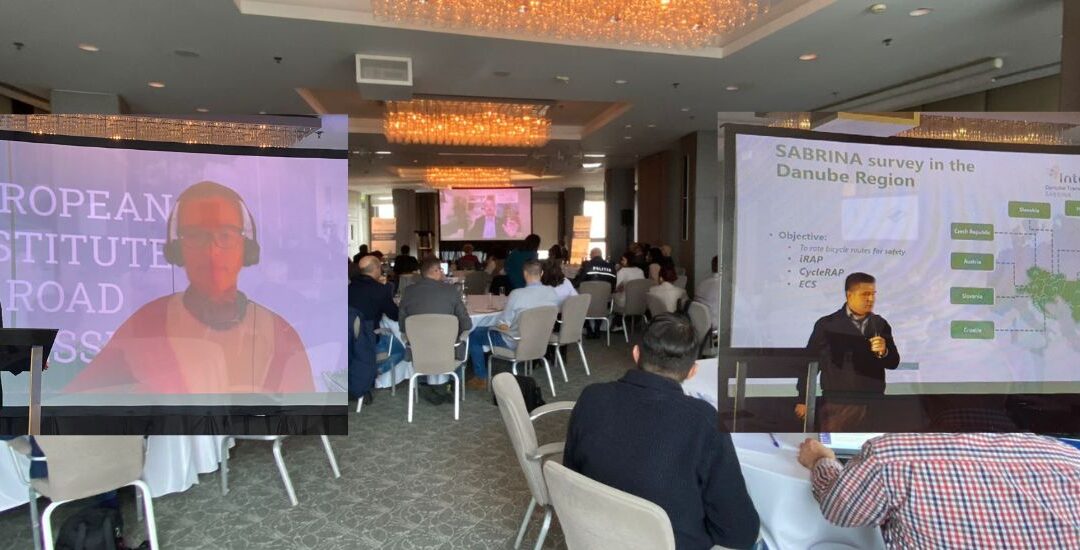Press release: How can we have safer cycling routes in the Danube area?
Bucharest, 23 November 2022
The final conference of the SABRINA project, “Safer Bicycle Routes in the Danube Region”, an event organised in cooperation with the European Strategy for the Danube Region (EUSDR) – AP1b: Improving Mobility and Multimodality – Road, Rail and Air Links, brought together high-level international guests from the cycling and road safety fields to highlight the results of the project and demonstrate the benefits of a systematic approach to safer cycling infrastructure.
Joining from Australia, Rob McInerney in his opening speech talked about the great opportunities cycling brings in terms of environment, sustainability and health policies and added “ if cycling facilities are not safe for all then we have lost opportunities to improve these policies. We must demand minimum 3 stars safety for cycling infrastructure for all users. Good practices and successes need to be celebrated by governments, engineers, stakeholders and local communities.”
“We need the EU to raise the level of cycling across the continent through a cohesive strategy that funds and implements cycling infrastructure. We need all European governments to promote cycling as a way to reduce transport emissions and achieve other societal benefits, such as reducing air and noise pollution. Cycling must be integrated as a fully fledged mode of transport”, said Philip Amaral, ECF – European Cyclists’ Federation Policy and Development Director.
Raising awareness and involving road safety stakeholders more actively are also among the objectives of the SABRINA project, said Olivera Rozi, European Road Assessment Institute.
“We had many challenges in running this project including road safety awareness and the COVID-19 virus. In fact, the pandemic was the biggest challenge, but if in a normal period we would have met seven or eight times, now we have seen each other and talked weekly and we have managed to create this community,” said Olivera Rozi.
“We need to change our mobility habits to have sustainable transport. We need to move to intermodal transport, and cycling is an integrated part and should be accessible to all,” said Franc Zepic, from the Ministry of Infrastructure, Slovenia.
The conference debates and presentations focused on safety assessments of EuroVelo routes, a decision support system for all stakeholders, pilot studies and trainings in all nine participating countries and collection of best practices and fact sheets.
According to Marko Sevrovic, senior road safety engineer at the European Institute for Road Assessment – Eurorap, the SABRINA project assessed cycle routes on six EuroVelo routes in nine countries, of which more than 2,500 kilometres in the Danube region.
“We quantified road safety on these routes using iRAP, CycleRAP and ECS (European Certification Standard) assessment methods. CycleRAP was developed within SABRINA and helps us to identify and map where accidents are likely to occur between cyclists and other categories of light mobility,” said Marko Sevrovic.
The SABRINA project has also developed a Safer Cycling Routes Toolkit, which will increase the capacity of stakeholders to make decisions and facilitate cooperation at different levels, thus preventing the development of a cycling infrastructure that puts users’ lives at risk. Moreover the project produced 30 factsheets on cycling risks, solutions and benefits as well as a Best Practice Report – all online available at https://www.interreg-danube.eu/approved-projects/sabrina .
Speakers at the conference included Olivera Rozi, EIRA – European Institute for Road Assessment – EuroRAP, Slovenia (via video), Rob McInerney, CEO iRAP, Australia (via video), Gabor Șandor – State Secretary, Ministry of Transport and Infrastructure, Romania, Franc Zepic, EUSDR PAC Air-Rail-Transport, Ministry of Infrastructure, Slovenia, Philip Amaral, Director Policy and Development ECF – European Cyclists Federation, Belgium, Marko Sevrovic, European Institute for Road Assessment – Eurorap, Slovenia, George Ursachi, Agile Transport Analysis, Romania, Leonid Ljubotina, University of Zagreb, Faculty of Transport and Traffic Sciences, Croatia, Andelo Marunica, University of Zagreb, Faculty of Transport and Traffic Sciences, Croatia, Zsombor Aradszki, Westpannon Regional and Economic Development Public Nonprofit Ltd. , Hungary, Bostjan Primc, Municipality of Ilirska Bistrica, Slovenia, Maria Fleischer, Austrian Road Safety Council, Austria, Jitka Vrtalová, Partnership for Urban Mobility, Czechia (Danube Cycle Plans project), Ionut Maftei, Bike in Time, Romania (Danube Cycle Plans project), Aleksander Buczynski, ECF – European Cyclists’ Federation, Belgium, Shanna Luchessi, International Road Assessment Programme, Klaus Machata, Austrian Road Safety Council, Austria, Virginia Mandalac, Automobil Club Moldova, Republic of MoldovaFlorin Nemtanu, Vice-Dean of the Faculty of Transport, Politehnica, Romania, Raluca Fișer, Green Revolution, Romania.
For more information:
Olivera Rozi
olivera.rozi@eurorap.org


















